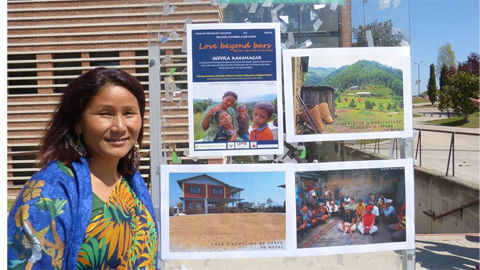"Great part of crimes committed are because lack of proposals"
Indira Ranamagar was born into a poor Nepali family and was subjected to forced labour. This is why, after her experience with the human rights activist Parijat, she founded Pa Nepal in 2000.

"If the governments would focus on vulnerable people, crime would reduce to the half"-Which was your objective when you started the NGO Prisoners Assistance Nepal (Pa Nepal)?
The NGO was born to satisfy the basic needs of prisoners in Nepal and their sons and daughters, who generally live in the same prisons with their mothers and fathers. We take care of both prisoners (a totally forgotten and stigmatised group) and their sons and daughters.
-Which is your main task?
From an emotional and affective perspective, we support and give comprehension to prisoners. At the same time, we offer training about agriculture, health and food, responsibility, values of collectivity. The objective is that prisoners can come back to their communities and survive without being exploited. We have also created residential schools outside the prisons so that kids can live there. We look after more than 400 boys and girls.
-What means to you being an activist and a woman in Nepal?
It is very difficult to be a woman. I always face problems when I deal with the police or bureaucracy. They try to attack me and they talk about me behind my back to try to humiliate me. I even had to change houses many times.
-How do you face problems?
I never get scared and I try to be always nice. I’m not afraid of any challenge, that’s for sure. I’m very honest with my work, I always fight and I never give up. When I say I’m going to do something, I do it and I fight until the end.
-Do you believe in prisons? In case of a good prison, would you believe in it as a method to improve society?
I don’t believe in the current penitentiary system. I think it should be more creative, it should be more than just locking people up and not letting them out. There should be more activities, more community work, more communication and more education. We should treat people well and know what they need. We should try to look for the cause of the problem and find out why they committed crimes. Prisons should be like hospitals, where sick people come in and then come out 100 % healed. If prisoners were treated well, they could come back to a renewed and fairer society.
-How do you fight against the stigma of prisoners?
Fighting against stigmas is very difficult. People think that all prisoners are criminals, that everything related to them is negative. They don’t ask why they committed a crime, they just see the dark side, they only see that they are bad people and they have to be punished. However, they don’t see that they are completely forgotten people. They have to take into account that approximately 75% of prisoners turn out to be innocent.
-Do you think there should be a change in the way of thinking?
Yes, there should be a change in the mentality of people because young generations are the only ones that really can make a big change. We should talk more about problems in education in our system since primary school.
-Which political and social changes do you think should happen to change the situation?
I believe each country should create a child welfare programme and invest more directly in children. If the government of Nepal or any other country would focus in vulnerable people, crime would reduce to the half. Great part of crimes committed are because lack of proposals.
-What does Junkiri mean?
It means “light” in Nepali and it is the name of one of our educational programmes, because it symbolise the own light inside every student. This is an alternative educational system to detect and cover the specific needs of boys and girls rescued from prisons.
-How does the government react when you create an alternative educational system?
I just made the proposal and the government accepted that other schools considered our philosophy and our method. The idea is that anything you do, you have to love it and you have to enjoy it. Teachers should understand the values they teach and I think that sometimes they don’t get involved, they just teach “A, B, C, D..”, that children should memorise it, and that’s all. In my opinion, this is not a good method; therefore we have to work a lot with social workers, with teachers...
-Which means do you have to achieve all this?
I dedicate all my time.
-How do you see yourself in ten years?
In ten years I want to achieve that new generations talk about the stigma and all these topics in schools so that every children can live with dignity. I’m fighting for the dignity of these children.
Note: After the talk and the interview, Nepal has suffered an earthquake that has caused more than 5,000 casualties and 10,000 injured, apart from serious material damages. Kaliu Nepal has a bank account for people who want to make a contribution.